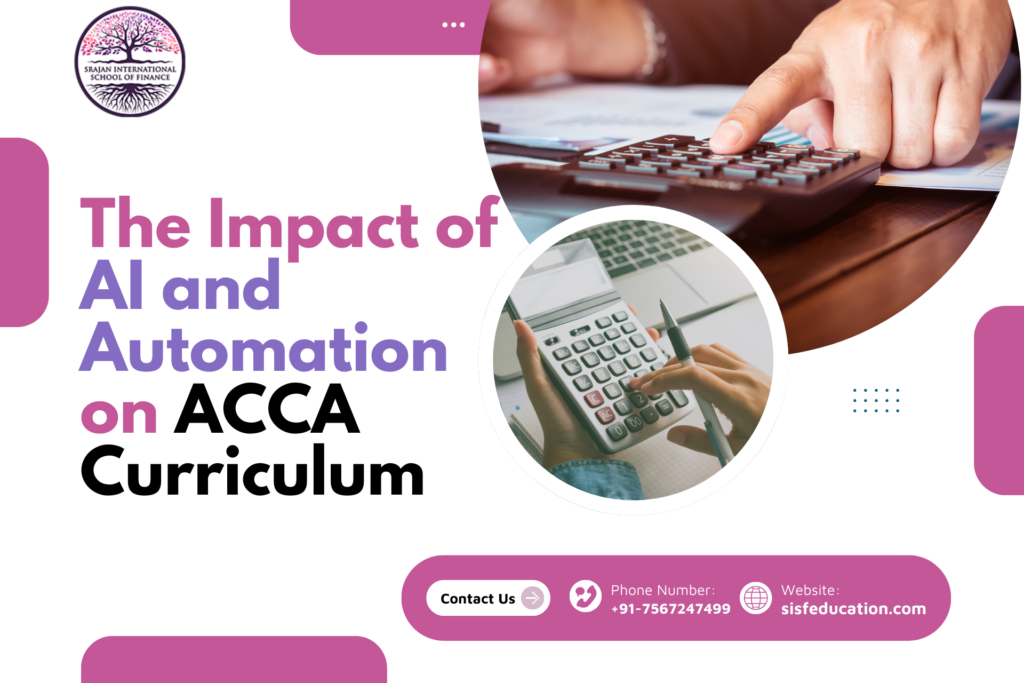How AI Is Transforming the Accounting Profession
Artificial Intelligence (AI) is no longer a futuristic concept—it’s an everyday reality in the finance and accounting world. From automating audits to predictive analytics, AI is changing how accountants operate. Traditional roles focused on manual bookkeeping and reporting are evolving into strategic, data-driven advisory roles.
Key transformations include:
- Automated transaction processing
- Real-time financial analysis
- Predictive modeling and forecasting
- Risk assessment and fraud detection
Accountants today need to blend technical knowledge with analytical skills to stay relevant in this AI-driven landscape.
Why ACCA Updated Its Curriculum to Include AI and Automation
Recognizing these industry changes, ACCA has proactively updated its curriculum to ensure future accountants are ready for a digital world. The focus is now on embedding technology-related competencies alongside core accounting skills.
Reasons for the update:
- Equip students for new-age finance roles
- Reflect market demand for digital skills
- Maintain global relevance of the ACCA qualification
Institutes offering ACCA classes in Udaipur are already incorporating these changes into their training programs, preparing students for a more dynamic and tech-driven job market.
Key Changes in the ACCA Syllabus Related to Technology
Several significant updates have been made to the ACCA syllabus to address technology and automation:
Main areas of change:
- Introduction of “Digital Business and Data Analytics” modules
- Greater emphasis on technology governance and cybersecurity
- Integration of digital ethics and innovation into the Strategic Professional level
These updates ensure that ACCA students aren’t just keeping up but leading the change in the accounting world.
Emerging Skills ACCA Students Need in the Age of Automation
As automation takes over routine tasks, ACCA students must develop a range of new skills to stay competitive and valuable to employers.
In-demand skills include:
- Data interpretation and visualization
- Critical thinking and problem-solving
- Financial modeling and business analysis
- Digital literacy across accounting platforms
Quality institutes offering ACCA Coaching in Udaipur focus on building these core and soft skills through modern learning approaches.
The Role of Data Analytics in ACCA Training
Data analytics has become a core pillar of the modern accounting profession. ACCA now integrates data management, data extraction, and interpretation into its training modules.
Key analytics skills taught include:
- Reading and interpreting large datasets
- Using dashboards and visualization tools (like Power BI)
- Applying predictive analytics to financial decision-making
Mastering these areas ensures students can provide strategic insights, not just reports.
AI and Ethical Considerations in the ACCA Curriculum
While technology offers efficiency, it also raises ethical challenges. AI can unintentionally reinforce biases or lead to compliance issues if not managed properly.
Ethical topics covered include:
- Data privacy and security compliance
- Ethical use of AI in decision-making
- Managing algorithmic biases
Training at an ACCA Institute in Udaipur like SISF Education ensures that students understand not just the technical aspects, but also the ethical responsibilities they carry in a digital world.
Impact of Robotic Process Automation (RPA) on Accounting Jobs
Robotic Process Automation (RPA) is streamlining repetitive accounting tasks, allowing finance teams to focus on value-added activities.
Processes commonly automated include:
- Invoice processing
- Bank reconciliations
- Payroll management
- Compliance reporting
While RPA reduces certain job roles, it also creates opportunities for accountants to become analysts, strategists, and consultants.
How ACCA Prepares Students for a Digital Finance World
The ACCA qualification is designed to create forward-thinking finance professionals who are adept in both traditional skills and digital innovation.
How ACCA prepares students:
- Embedding technology into every exam and module
- Focusing on strategic leadership in a digital era
- Encouraging continuous professional development (CPD) with digital certifications
By staying aligned with technological advancements, ACCA ensures that its graduates remain future-ready.
Future Job Roles for ACCA Professionals in an AI-Driven Market
The accounting profession is evolving. ACCA-qualified professionals now have access to a range of exciting new job roles driven by technology.
Emerging job titles include:
- Finance Data Analyst
- Digital Transformation Officer
- Risk and Compliance Manager for AI systems
- Strategic Business Consultant
These roles combine accounting expertise with tech-savvy insights, positioning ACCA graduates as key players in modern businesses.
Why Continuous Learning in Technology Is Critical for ACCA Students
Technology is not static; it’s evolving rapidly. ACCA students and qualified professionals must adopt a lifelong learning mindset to stay competitive.
Strategies for continuous learning:
- Pursue CPD certifications in data analytics, AI, and fintech
- Attend webinars, workshops, and seminars on emerging tech
- Engage with professional networks focused on digital finance
Those who embrace continuous learning will be the ones leading the future of accounting and finance.
Conclusion
The impact of AI and automation on the ACCA curriculum marks a pivotal evolution in accounting education. No longer is it enough to master debits and credits—today’s ACCA students must be tech-savvy, analytically sharp, and ethically grounded.
With strategic curriculum updates, a focus on digital skills, and the integration of practical technology training, ACCA ensures its students are prepared not just for today’s market, but for the finance world of tomorrow. Institutes like SISF Education in Udaipur are taking these changes seriously, helping students thrive in an industry where technology and human expertise must go hand in hand.



